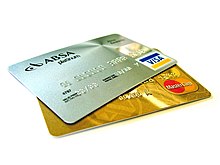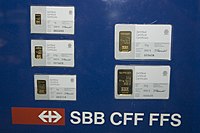e-gold
e-gold is a digital gold currency and online payment system operated by e-gold Ltd. since 1996, which allows the transfer of money between e-gold account holders, and is also a means of investing in gold and precious metals. There are a little under 2.4 million e-gold accounts in existence today.
The e-gold payment system offers a variety of currencies, "e-metals", namely e-gold, e-silver, e-platinum and e-palladium, representing a claim in gold, silver, platinum and palladium respectively. Of these, e-gold is by far the most popular e-metal in the system. The user may take physical delivery of the precious metal upon payment of an additional fee. However, most users permit the operator to retain possession of the metal. e-gold transaction are completed electronically, usually over the Internet, and they always settle by weight of the metal even if denominated in some other way.
Even though e-gold does not advocate any particular political agenda as, for example, Liberty Dollar does, e-gold could be viewed as a libertarian system of money because it is not subject to government policies in the same way as the Federal Reserve alters the value of the dollar.
Features
Convenience

e-gold is seen by proponents as an alternative to traditional forms of payment, which in some cases (especially in online transactions) may be less efficient or more costly. The e-gold system (as well as other digital currencies) provides a system where transactions clear instantly. This is in contrast to cheques or credit card transactions which when used could take days for funds to be deducted from an account. Also, unlike other online payment systems such as PayPal, there are no distinctions between merchant and non-merchant e-gold accounts. As such, all e-gold accounts carry the same fees and have the same capacity to receive and transmit e-gold account holdings.
Asset protection
Proponents of the e-gold system contend that e-gold assets are protected against inflation, devaluation and other possible economic risks inherent in fiat currencies. These risks include what are perceived by e-gold proponents as harmful actions by national governments and central banks that diminish the value of assets held in fiat currencies. Also, many proponents of the e-gold system believe that e-gold offers a truly international and decentralized currency which is unattached to a central bank of a particular country or territory.
There is also no way of having transactions reversed, even in case of a legitimate error or an unauthorized spend (see below). e-gold's Terms of Use stipulate that all spends are final and e-gold cannot be held responsible for any spend. In this respect, an e-gold spend is more akin to a cash transaction while PayPal transfers, for example, could be considered more similar to credit card transactions.
Growth Rate
The number of e-gold accounts (as claimed by e-gold) grew from 1 million in November 2003 to just under 2.5 million in November 2005. That growth rate represents a compound growth rate of 58% per annum. This high growth rate has been sustained by e-gold almost since inception.
http://www.e-gold.com/stats.html
Criticism
Inconvenience
Compared to other systems like PayPal, the process of buying e-gold can be confusing to a person unfamiliar with the e-gold system. Unlike some digital currency operators, e-gold Ltd. does not sell digital currency directly to the user. Instead, numerous third party exchange services sell e-metal in exchange for a fiat currency, for a percentage transaction fee. Conversely, these exchange providers will sell fiat currency in exchange for an e-metal, also for a percentage transaction fee. In this manner e-metals can be converted back and forth to a variety of fiat currencies of different countries. The amount of a particular fiat currency or e-metal necessary to complete a transaction is determined by the then current spot price of the metal in relation to the value of the fiat currency.
Security and fraud
As an online service, e-gold is vulnerable to various threats, notably phishing (for example, forged emails asking for login details) and spyware. Recently, a specially created trojan compromised "dozens" to "the low hundreds" of e-gold accounts. While trojans usually silently record the login details of the unsuspecting user, the trojan in question (Win32.Grams) emptied the accounts themselves by transferring the contents (presumably) to the attacker's account.
e-gold has also notoriously been the medium of choice for many online con-artists. Pyramid schemes and fraudulent investment programs are commonplace. This is presumably due (at least in part) to e-gold maintaining its policy of irreversibility of e-gold transactions.
Many e-gold exchange providers also require a high level of identification, in many cases the same level if not higher than most banks. In comparison, processors such as PayPal and StormPay allow users to set up accounts easily and only ask for identification to increase the maximum daily spend limit.
Backing

There is no way of knowing if e-gold Ltd. really has the gold to back the currency in the e-gold system. e-gold does maintain an "Examiner", a web page with updated statistics on outstanding liabilities and the total amount of each precious metal in its holding. While proponents generally consider this assuring enough, critics remain sceptical.
Also, since all e-gold is backed by a physical commodity, it's subject to price fluctuations that naturally occur around that commodity. This can be a major problem if there's a sudden increase in the supply of gold and you're holding e-gold currency, the value of your currency just decreased; you've lost money. This can, however, work both ways. Proponents of the e-gold system would argue that the risk of significant price fluctuation is small compared to the perceived risk of value fluctuations among fiat currencies.
External links
- Official site
- Los Angeles Times article describing the Win32.Grams incident.
- Security report on Win32.Grams
- About e-gold in Polish language
